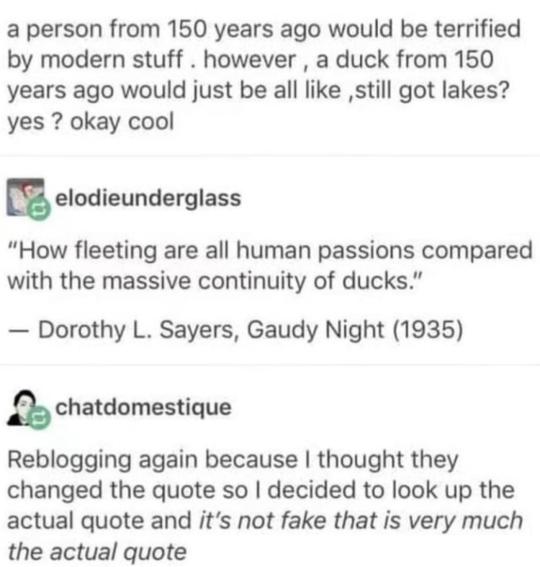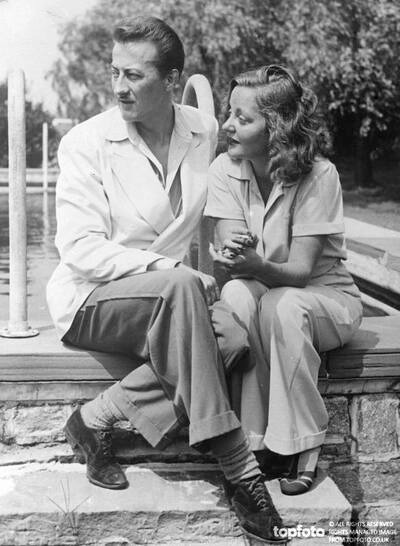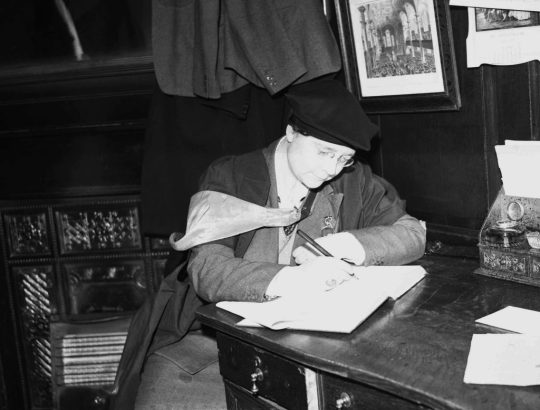#Dorothy L. Sayers
Text

1K notes
·
View notes
Text
A man once asked me ... how I managed in my books to write such natural conversation between men when they were by themselves. Was I, by any chance, a member of a large, mixed family with a lot of male friends? I replied that, on the contrary, I was an only child and had practically never seen or spoken to any men of my own age till I was about twenty-five. “Well,” said the man, “I shouldn’t have expected a woman (meaning me) to have been able to make it so convincing.” I replied that I had coped with this difficult problem by making my men talk, as far as possible, like ordinary human beings. This aspect of the matter seemed to surprise the other speaker; he said no more, but took it away to chew it over. One of these days it may quite likely occur to him that women, when left to themselves, talk very much like human beings also.
Dorothy L. Sayers
2K notes
·
View notes
Text
Lucian's Library 3
Feel free to suggest never written books you wish you could read.
Option slightly shaved to fit the format.
#Patrick Rothfuss#The Kingkiller Chronicle#The Sandman#Terry Pratchett#The Mystery of Edwin Drood#Charles Dickens#Hilary Mantel#Shirley Jackson#Elizabeth Gaskell#A Mansfield Park#Jane Austen#Patrick O'Brian#Aubrey–Maturin series#C.S. Lewis#Agamemnon#Dorothy L. Sayers#Lord Peter Wimsey#Kubla Khan#Samuel Taylor Coleridge#Christopher Marlowe#Kit Marlow
240 notes
·
View notes
Text
"Either as Captain O'Shea or the vengeful Earl, John Emery was a fine young romantic actor. He had style and eloquence and was completely at ease in costume drama. In July of the same year [1937] I was to see him as Lord Peter Wimsey in Busman's Honeymoon at the Westport County Playhouse in Connecticut. As is the custom in summer theaters, his engagement was for only a week. He'd had but a week of rehearsal, yet he gave a deft and amusing performance. At the time I was living in a rented house on Long Island Sound, ten miles from Westport. It boasted a swimming pool and free liquor. There I held open house for the likes of Anna May Wong, Clifton Webb, Estelle Winwood, Vincent Price, Louisa Carpenter and a lot of other friends, overloaded with leisure.
"I got a sizzling crush on John on seeing his Wimsey. After the performance I went back to see him. Would he care to spend the week end with me? John readily agreed. I found him intelligent, amusing and exceptionally good-looking. He had good manners and seemed a good listener. This last marked him a rare bird in the set in which I traveled.
"But when John asked me to marry him, I looked upon his offer as an impertinence. Wasn't he getting presumptuous on short acquaintance?"
--Tallulah Bankhead on meeting her husband John Emery, from Tallulah: My Autobiography (Ch. 10)

Newlyweds John Emery and Tallulah Bankhead, September 1937 (x)
#dorothy l. sayers#lord peter wimsey#busman's honeymoon#john emery#tallulah bankhead#was NOT expecting a lord peter reference in this book#tallulah: my autobiography#westport county playhouse
137 notes
·
View notes
Text
Christ walks the world again, new-bound on high emprise,
With music in His golden mouth and laughter in His eyes;
The primrose springs before Him as He treads the dusty way,
His singer’s crown of thorns has burst in blossom like the may,
He heedeth not the morrow and He never looks behind,
Singing: “Glory to the open skies and peace to all mankind.”
Singing: “Lady, lady, will you come away with Me?
Was never man lived longer for the hoarding of his breath;
Here be dragons to be slain, here be rich rewards to gain . . .
If we perish in the seeking . . . why, how small a thing is death!”
--From "Desdichado" by Dorothy L. Sayers
25 notes
·
View notes
Note
Hello! Seeing as you are (checks posts) the Designated Wimseyverse Consultant on this website, I wondered if you could answer a quick question for me. I read recently that Ngaio Marsh and Dorothy L. Sayers hated each other (or at least, that Marsh hated Sayers?) but I'm having some trouble googling it, and so far skimming biographies of each of them hasn't brought me any results either. Do you happen to know the scoop?
Hello! Pleased to be a Wimseyverse consultant, would never have the presumption to claim the definite article (but thank you.)
I'm not sure how much of a scoop there is to be had, actually. This may be partially because Marsh systematically burned many of her personal papers. There are some very thinly-veiled digs at/insults of Sayers in Marsh's Overture to Death, where two unpleasant characters are partially based on her. Obliquely, she is described as self-dramatizing and self-deceiving, a "large arrogant spinster" who "adored scandal and... cloaked her passion in a mantle of conscious rectitude." I don't think this is fair. But I do think it is telling.
DLS appears to have cared considerably less about gendered notions of respectability than Marsh. But she may also have suffered less from their enforcement. I think it's noteworthy that while Marsh was surrounded by rumors of queerness (and what historian Judith Bennett might call lesbian-like relationships), she's also much less compassionate to queer/gnc women than Sayers is in her novels. I think it's also worth noting that Marsh appears to have had less ambivalent attitudes than Sayers towards the police, but also vigorously and categorically disapproved of the death penalty.
I'm not sure how Sayers and Marsh's different attitudes towards genre may also have contributed towards this. Sayers was, like me, a Sherlockian, and a cheerful meta-commenter on crime novel tropes. When Marsh comments on other authors/detectives in the pages of the Alleyn novels, it's to mock them. I don't know enough about their attitudes as expressed elsewhere to comment more on this, but I think it's another interesting fact. The speculation that Marsh may have resented Sayers' more successful transcending of genre remains just that.
So, in short: I don't have a scoop. I only have very tenuous theories. As far as I've read/found, the antipathy does appear to have been one-sided. Others may well know more!
94 notes
·
View notes
Text

File this one under “things that make me inordinately happy”: tea in a custom Dorothy L. Sayers mug.
93 notes
·
View notes
Text
I like a nice, quiet, domestic murder myself, with the millionaire found dead in the library. The minute I open a detective story and find a Camorra in it, my interest seems to dry up and turn to dust and ashes - a sort of Sodom and Camorra, you might say.
From "The Unsolved Puzzle of the Man with No Face", a Lord Peter Wimsey short story by Dorothy L. Sayers
88 notes
·
View notes
Text
"Here's a deep, damp ditch on the other side, which I shall now proceed to fall into." A slithering crash proclaimed that he had carried out his intention.
Clouds of Witness by Dorothy L. Sayers
50 notes
·
View notes
Text

Wimseyverse friends, the spirit of your posting came over me when I last entered a used book store. Although I had never consciously considered looking for this book, I knew that if the bookstore had it in stock, I would purchase it. And now, here we are.
#gaudy night#dorothy l. sayers#lord peter wimsey#harriet vane#wimseyverse#books#booklr#reading#bookish#bibliophile
28 notes
·
View notes
Text
What up Sayers hivemind, it's your girl Sarah here with another question I can't resolve by doing a "find in page" on the ebooks.
I am positive that at some point (probably in a short story) Peter uses the "an ill-favoured thing, but mine own" quote from As You Like It to apologize for his face, but I haven't been able to remember or find where it is. He uses it in Bellona to apologize for his sleuthing, and in Busman's to apologize for his title, but I am as sure as the human mind can be without evidence to back it up that there's another reference somewhere.
Anybody?
#Lord Peter Wimsey#Lord Peter#Dorothy L Sayers#Dorothy L. Sayers#Dorothy Sayers#the “hi sorry for existing no worries if not” vibes on that man
28 notes
·
View notes
Text

Reading on a mostly empty train this evening 💕
#currently reading#booklr#book photography#strong poison#lord peter wimsey#dorothy l. sayers#mystery#krimi#who dunnit
108 notes
·
View notes
Text

A man once asked me … how I managed in my books to write such natural conversation between men when they were by themselves. Was I, by any chance, a member of a large, mixed family with a lot of male friends? I replied that, on the contrary, I was an only child and had practically never seen or spoken to any men of my own age till I was about twenty-five. "Well," said the man, "I shouldn't have expected a woman (meaning me) to have been able to make it so convincing." I replied that I had coped with this difficult problem by making my men talk, as far as possible, like ordinary human beings. This aspect of the matter seemed to surprise the other speaker; he said no more, but took it away to chew it over. One of these days it may quite likely occur to him that women, as well as men, when left to themselves, talk very much like human beings also.
Dorothy L. Sayers, Are Women Human? Astute and Witty Essays on the Role of Women in Society
#sayers#dorothy l. sayers#quote#literature#writer#author#feminism#art of writing#misogyny#english#culture
53 notes
·
View notes
Text

I didn't find any Sayers at the Antiquarian Book Fair this year, but did spot this John Donne first edition that Lord Peter might have wanted for his collection.
#dorothy l. sayers#lord peter wimsey#rare books#john donne#it may not be an incunable but we all know that peter has always been queer about donne#book collecting
30 notes
·
View notes
Text
Pieces of The Man Born to Be King that are lingering in my head lately:
After Jesus heals the man born blind, he goes back to talk to him, and the blind man rhapsodizes about how beautiful it is to see the moon for the first time and is like, "Can you imagine what it must be like to see it new like this?" And then Jesus quotes Genesis because he's remembering when He created the moon!
Pilate's hearing Jesus' case and doesn't care too much about this provincial religious dispute. Then the Jewish leaders tell him that Jesus has made himself a god, and Pilate goes back to Jesus and is like, "Where are you from?" with an almost desperate fear, because a god walking the earth is a much more real possibility to a pagan.
#catholic things#the man born to be king#dorothy l. sayers#i was going to do a longer list of cool moments but decided to keep it to these two#as the ones that are most vividly sticking in my head at the moment
167 notes
·
View notes
Text
I've decided that this is going to be my year of applying for fellowships that will allow me to (temporarily) escape the comparative drudgery and near-constant demoralization¹ of teaching unprepared and incurious students in a deep red state.² This means, of course, actually writing the fellowship apps. Wish me luck, send good vibes, etc.
¹ I know I'm very lucky to have this job. I do. And I care about my students and their learning. It's just... I seem to care about their learning far more than they do. All the time. Most of them aren't prepared for the kind of learning I have been trained to facilitate. (Yes, I have gotten new training. Yes, I try anyway. All the time. Sometimes it feels rewarding. Much of the time it feels like rotten work.) Meanwhile the state government is, unsurprisingly, actively legislating to make my job harder.
² I was recently talking about the demoralization with my chair, whose response was basically "Ah yes, the Despair, we've all seen it," because literally everyone who works here reaches a moral-injury-induced breaking point around the point in their time here that I've reached. So.
#adventures in academia#about me#let us die in our tracks having accomplished nothing but an epic#dorothy l. sayers#was right as usual
97 notes
·
View notes